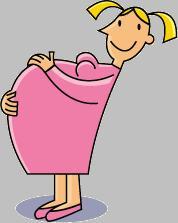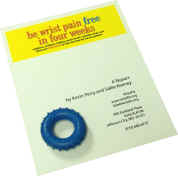Kyphosis and Bending Backwards
Never say "never."
I once told my yoga students no one ever bends backward in ordinary daily life. For instance, you don't do "the limbo" to pick your socks up off the floor. Of course, you don't.

The Limbo
But we bend forward all the time...to pick things up, to look at the computer screen, even to put our pants on in the morning.
I think, because we constantly bend forward and never bend backward, I see a lot of people with "rounded backs," or kyphosis. When the upper back is bent dramatically forward, it's called hyperkyphosis.

obvious examples of kyphosis
"Kyphosis is a curving of the spine that causes a bowing of the back, such that the apex of the angle points backwards leading to a hunchback or slouching posture." That's what the medical dictionary says. This is what it looks like:

kyphosis
Our spines were constructed to bend backwards. But you've got to do it. If you don't use it, you lose it.
I started this message by reminding us all to "never say never." I learned this lesson (once again) in church about a year ago. Up until then, I frequently made the pronouncement that no one ever bends backward in everyday life.
Then I saw it. The woman just ahead of me was holding her baby on her hip. Rather than turning around, she continued to face the front of the church, bent backwards and reached down to pick her baby's pacifier up off the pew.
People really do bend backwards in real life! When you look up at a bird flying overhead, you bend back. Sometimes when you reach for something on a high shelf, you bend backward.
Probably the most common backbend I see in real life is the posture of an expectant mom. As the baby gets bigger, moms bend backward to counter-balance the ever increasing weight of the baby. Here's an illustration that exaggerates the point:

back-bending mom
You might be surprised to learn, however, that you can bend backward and still slouch. Yes! You can lean back and still have your upper spine slouched forward into that kyphotic shape that crowds the internal organs, makes breathing difficult, and dooms you to a future of neck pain.
Look at these pics. When people lean back, they still collapse their chests!

You can lean back and still round your upper back. See the shoulders rounded forward?

See how he's leaning back, but rounding his upper spine and neck forward?
To get all the benefits of backbending you've got to learn to lengthen your spine (lift the breast bone away from the navel) and dig the bottom tips of your shoulder blades into the back of your ribcage. That action--using the shoulderblades--transforms posture and opens the chest.
When you do it, you relieve compression on your organs and breathing comes easier.
I think the best way to get the feel of using your shoulder blades for backbending, or in regular upright posture, is practicing the supported chest opener. Sometimes I just call it lying over a rolled up blanket, as shown here.

supported chest opener
It may take some getting used to, but you'll eventually love this practice. Enjoy it. Feel yourself breathe easier when you come out of it.
Don't just read about it. Get up. Experience it. Experience yoga!
Kevin Perry
www.ExperienceYoga.org
p.s., Here's a challenge to you readers. Get out your digital camera and take a picture of you doing the limbo, bending backward, to pick up your sock off the floor. Send it to me by email with permission to post it here. I'll send the first two of you who respond a free copy of my WristFix report, "Be Wrist Pain Free in Four Weeks" along with the Chinese exercise ring that goes with it. This is a $39.95 value that you get FREE!

The WristFix report and Chinese exercise ring
See www.WristFix.org for more details about the report, the Chinese exercise ring, and how these exercises can eliminate pain, numbness, tingling, weakness and other hand or wrist problems.
My email address is info@experienceyoga.org.
p.p.s., The contents of this message and everything on this web page do not constitute medical advice. This material is not given for the purpose of diagnosis or treatment. For diagnosis or treatment, you should consult a licensed medical professional.
p.p.p.s., Digging your shoulder blade tips into your back ribs is just one component of the shoulder loop. The shoulder loop is just one of the many loops and spirals of Anusara yoga that, when practiced, return the body to its optimal blueprint for alignment. Want to know more? Click here.
Copyright 2005. All rights reserved by Mo Yoga LLC.
I once told my yoga students no one ever bends backward in ordinary daily life. For instance, you don't do "the limbo" to pick your socks up off the floor. Of course, you don't.

The Limbo

But we bend forward all the time...to pick things up, to look at the computer screen, even to put our pants on in the morning.
I think, because we constantly bend forward and never bend backward, I see a lot of people with "rounded backs," or kyphosis. When the upper back is bent dramatically forward, it's called hyperkyphosis.

obvious examples of kyphosis

"Kyphosis is a curving of the spine that causes a bowing of the back, such that the apex of the angle points backwards leading to a hunchback or slouching posture." That's what the medical dictionary says. This is what it looks like:

kyphosis

Our spines were constructed to bend backwards. But you've got to do it. If you don't use it, you lose it.
I started this message by reminding us all to "never say never." I learned this lesson (once again) in church about a year ago. Up until then, I frequently made the pronouncement that no one ever bends backward in everyday life.
Then I saw it. The woman just ahead of me was holding her baby on her hip. Rather than turning around, she continued to face the front of the church, bent backwards and reached down to pick her baby's pacifier up off the pew.
People really do bend backwards in real life! When you look up at a bird flying overhead, you bend back. Sometimes when you reach for something on a high shelf, you bend backward.
Probably the most common backbend I see in real life is the posture of an expectant mom. As the baby gets bigger, moms bend backward to counter-balance the ever increasing weight of the baby. Here's an illustration that exaggerates the point:

back-bending mom

You might be surprised to learn, however, that you can bend backward and still slouch. Yes! You can lean back and still have your upper spine slouched forward into that kyphotic shape that crowds the internal organs, makes breathing difficult, and dooms you to a future of neck pain.
Look at these pics. When people lean back, they still collapse their chests!

You can lean back and still round your upper back. See the shoulders rounded forward?


See how he's leaning back, but rounding his upper spine and neck forward?

To get all the benefits of backbending you've got to learn to lengthen your spine (lift the breast bone away from the navel) and dig the bottom tips of your shoulder blades into the back of your ribcage. That action--using the shoulderblades--transforms posture and opens the chest.
When you do it, you relieve compression on your organs and breathing comes easier.
I think the best way to get the feel of using your shoulder blades for backbending, or in regular upright posture, is practicing the supported chest opener. Sometimes I just call it lying over a rolled up blanket, as shown here.

supported chest opener

It may take some getting used to, but you'll eventually love this practice. Enjoy it. Feel yourself breathe easier when you come out of it.
Don't just read about it. Get up. Experience it. Experience yoga!
Kevin Perry
www.ExperienceYoga.org
p.s., Here's a challenge to you readers. Get out your digital camera and take a picture of you doing the limbo, bending backward, to pick up your sock off the floor. Send it to me by email with permission to post it here. I'll send the first two of you who respond a free copy of my WristFix report, "Be Wrist Pain Free in Four Weeks" along with the Chinese exercise ring that goes with it. This is a $39.95 value that you get FREE!

The WristFix report and Chinese exercise ring

See www.WristFix.org for more details about the report, the Chinese exercise ring, and how these exercises can eliminate pain, numbness, tingling, weakness and other hand or wrist problems.
My email address is info@experienceyoga.org.
p.p.s., The contents of this message and everything on this web page do not constitute medical advice. This material is not given for the purpose of diagnosis or treatment. For diagnosis or treatment, you should consult a licensed medical professional.
p.p.p.s., Digging your shoulder blade tips into your back ribs is just one component of the shoulder loop. The shoulder loop is just one of the many loops and spirals of Anusara yoga that, when practiced, return the body to its optimal blueprint for alignment. Want to know more? Click here.
Copyright 2005. All rights reserved by Mo Yoga LLC.


7 Comments:
Thanks Kevin. I have kyphosis and am trying to find material on doing yoga with a jacked up neck. I haven't tried the blanket thing yet. peace.
I have Kyphosis and i am trying Yoga next week. I hope it helps me.
"I think, because we constantly bend forward and never bend backward, I see a lot of people with "rounded backs," or kyphosis" ... and flies spontaneously generate from unrefrigerated meat... and homosexuals had refrigerator moms... did you every study kyphosis? ever attend a medical school class? have you considered how irresponsible it is to make such unvalidated claims? while i applaud your attempt for advocating natural therapy, for people like myself living with kyphosis, it is really best to seek the advice of a professional.
Thank you for these tips! I will try this tonight and am planning to sign up for yoga this week!
i found your blog on google.. Im really impressed with the topics you have..
Ya, Exercise is very important in person's life in order to be physically fit and have a good health. One of this exercise which help us to be physically fit is the yoga. Exercise is one of the besty weapon also against illnesses and depression.
I believe everyone ought to browse on it.
Thanks Kevin, it was great to read your article. I was searching for ways to ease my pain from kyphosis. I am wanting to try yoga or Pilates for long term pain relief. Am definitely keen to now. I'll be giving this blanket trick a go, thanks.
Post a Comment
<< Home